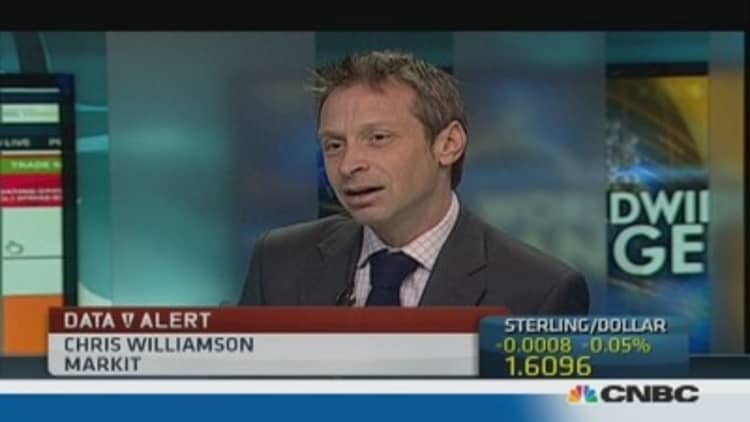
As the euro zone recovery continues its slow progression, France could be bucking the trend – just not in the right direction.
France's flash composite PMI (Purchasing Managers Index) – an indicator of the level of business activity – released on Thursday by Markit revealed that output contracted in November to a five-month low of 48.5, down from October's 50.5.
"It is a concern that it's slipping in the wrong direction," Chris Williamson, global chief economist at economic data provider Markit, told CNBC. "There's a risk of recession here."
The PMI numbers highlighted that export sales in November decreased for the first time since August and private sector firms registered a second consecutive monthly decrease in new business.
(Read more: Euro zone economy losing steam as PMIs disappoint)
Williamson said the data suggested the economy was "running at a level which is consistent with around 0.2 percent contraction in French GDP (gross domestic product)."
While the French economy saw a surprising return to growth in the second quarter, it is likely to have contracted again in the third quarter, as a preliminary GDP reading recorded a 0.1 percent decline.
"France is looking like a little bit of an outlier at the moment," said Williamson, with neighboring countries being pulled up by the German economy while France remains stagnant.
Indeed, the country appears to suffer blow-after-blow. Unemployment continues to hover around record highs of around 11 percent, and in its latest report published on Tuesday, the OECD (Organisation for Economic Co-operation and Development) forecasted that unemployment would remain elevated at these levels until 2015.
Furthermore, Standard and Poor's cut its credit rating for the country to AA from AA+ in early November, citing the government's difficulty in implementing necessary reforms.
But the picture may not be as dark as it seems, according to Williamson. "It's a very difficult story", he said, admitting that Markit failed to predict the second quarter uplift in the French economy. He added that France was now "bumping along a fairly stagnant level."
(Read more: S&P cuts France's sovereign credit rating)
For Dominique Barbet, economist at BNP Paribas, the latest PMI numbers did point towards a contraction in the last quarter of 2013, but he added: "I don't think it's a reliable indicator."
According to Barbet, PMI indicators have been unreliable in the past. As well as failing to predict the second quarter uplift, they also "kept on indicating a strong recession" for two years when France only went through "a long period of stagnation".
Furthermore, the French indicator suggested France was doing worse than both Italy and Spain, which Barbet said, was not the case.
Instead, Barbet forecasted French GDP would grow by 0.2 percent in the fourth quarter. But he added: "Where I worry a little bit is for the first quarter of next year," as new fiscal reforms effective from Jan 1 could have a negative impact, mostly on households who will be unable to avoid "the fiscal shock" associated with the rise in pension contributions.
"The real recovery will happen in the second quarter (of 2014), not before," he concluded.
(Read more: France may be 'major pothole' in 2014: Fund manager Hintz)
Follow us on Twitter: @CNBCWorld


